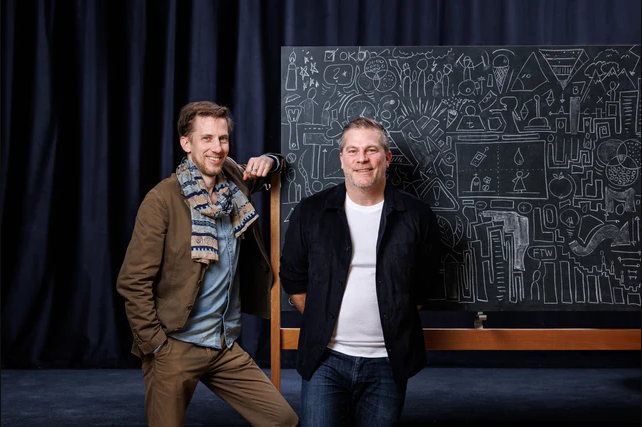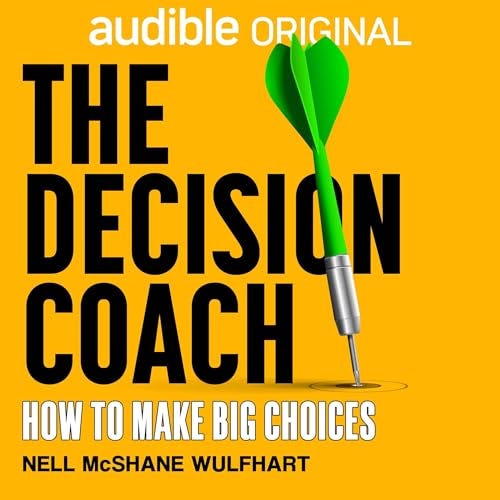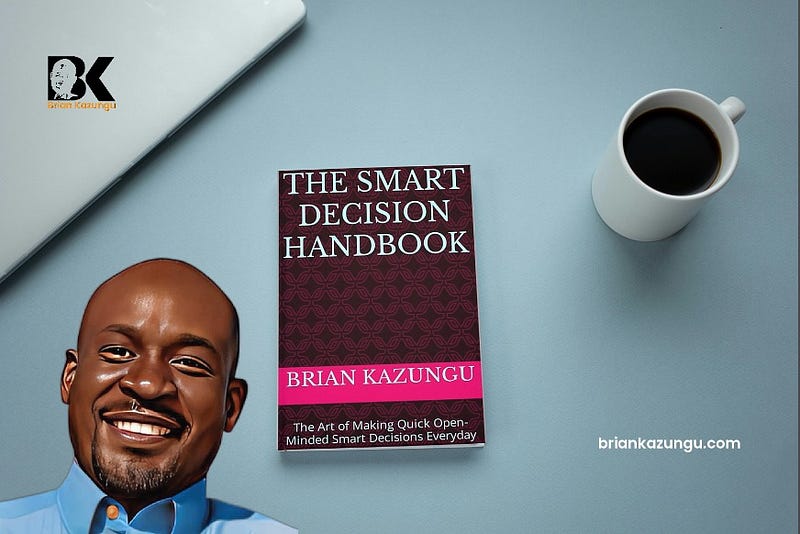Smart Decisions
Three Independent Journalists, Both Published Authors, One Common Agenda: Their Obsession with Helping People To Make Better Decisions
Published
3 weeks agoon

There are three main interesting facts about Mikael Krogerus, co-author of The Decision Book, Nell McShane Wulfhart, the Decision Coach who wrote the book, The Great Stewardess Rebellion and Brian Kazungu, author of The Smart Decision Handbook.
Mikael, Nell and Brian are both published authors who are also journalists (media practitioners) that are passionate about helping people make better decisions in life.
Even though their approaches to helping people make better decisions are different, they have both played a part in solving one of society’s biggest problems which is — people’s failure or inability to make sound decisions.
Mikael has so far collaborated with Roman Tschäppeler in various projects including co-authoring a best-selling literary work, The Decision Book which is basically a compilation of 50 critical thinking models that help with making better decisions.

On the other hand, Nell McShane Wulfhart has over half a decade of experience in offering decision making consultations to various clients under The Decision Coach banner.

She also has some decision coaching podcasts lined up where people will get a chance to experience her approach in assisting various individuals who are going through different circumstances which need the right decision to be made.

Using a different approach to that of Mikael Krogerus and Nell McShane Wulfhart, I use the Smart Decision Toolkit adapted from my book, The Smart Decision Handbook.

The Smart Decision Toolkit is based on the Fundamental Congruence Checklist which is basically a set of ten questions that help you to process information about any subject in order for you to understand it better.
In coming up with this checklist, I was influenced by the realisation that quite a number of bad decisions are actually made by people with good intentions but who lack the right tools or resources which can help them to be open-minded and objective when making decisions.
The unfortunate consequence of bad decisions is that they usually trigger a chain of undesirable outcomes.
If you do not get immediate help to assist you in making smart choices, you will continue to make another string of bad choices which turns you into the factory manager at a plant which manufactures your own problems.

In my passionate obsession with the decision-making subject, I have observed that those who broadly (objectively and open-mindedly) look into a matter tend to make better decisions than those who have a narrow view of what they are dealing with.
As such, the Fundamental Congruence Checklist mentioned above gives people a broader view of what they are working on since it seeks to answer various critical questions that are important for analysing information towards making informed decisions and taking the right action.
This checklist is a multi-versatile decision-making tool that can be used to gauge the relevance, effectiveness, and impact of anything in life through answering the following ten questions:
1) What is this thing? Who is this person?
2) What does he/she/it do and how? — What are the key result areas or objectives and how are they accomplished?
3) Why does he/she/it do so? — Why are those the key result areas, objective, or purpose?
4) What happens if he/she/it does do not anything or does not perform as expected?
5) Where is this thing or person situated in the whole matrix — what position does he/she/it occupy?
6) Why is he/she/it situated there? — Why is he/she/it occupying that space?
7) What happens if he/she/it is completely removed, moved somewhere, misplaced or even altered?
8) Who is in charge of him/her/it and why? — Who makes he/she/it work as planned?
9) How is his/her/its effectiveness assessed? — How do I or other people know if he/she/it is effective or not?
10) What happens if he/she/it is effective or not — What are the related consequences?
By using a Congruence Checklist, you will be able to clearly define the purpose of anything and then determine its relevance and interconnectedness to other things which are dear to you in life before you commit your energy, time, and resources to it.
When you don’t ask yourself these ten questions, you are most likely to make impulsive decisions out of emotions (excitement) and do things that are very costly and regrettable.
The ten questions in the Congruence Checklist gives you a broader perspective when you want to make a decision on an issue that has an effect on your health, time, money and other resources.
A Congruence Checklist helps to reveal the probable consequences of your decision on various other aspects of your life, i.e. the financial, emotional, or spiritual implications of your decisions and actions.
As such, if you want to make an important decision such as starting a business, getting into a partnership, getting married/divorced, quitting your job, voting for a politician, or even buying an asset, you need to ask yourself these ten questions before you make that final decision.

The main advantages of this checklist as a decision tool are that the first three questions focus on clarity of the subject matter by shedding light on the definition, purpose and processes associated with whatever you are dealing with.
The focus on these three issues helps with assurance/confidence on the fact that whoever is making a decision is doing so on a subject that he/she clearly understands.
Question Four (4) on the checklist helps the decision maker to be open-minded enough to understand that despite good intentions, some missions fail and thus, the mind should be prepared from the beginning to be accountable for such failures and to also come up with Plan B or even C.
The fifth, sixth and seventh questions on the checklist has a ‘Pareto’ effect in that it deals with essence and relevance as a way of evaluating the worthiness of consideration, adoption, and implementation on any subject matter.
These three questions focus on the assessment of importance.
When you answer these questions, you will be able to understand if whatever you are dealing with is really worth your time, money, energy and resources.
Question Eight (8) seeks to identify a person or group of people who are responsible for the implementation of a certain resolution and shows you the people who are tasked with the mandate of making sure that everything goes as planned (oversight).
The nineth and tenth question seek to address the issue of effectiveness, results and impact, since resolutions that are adopted without clarity on these issues are very costly in terms of time, energy, money and other resources.
If it is a board meeting, once all the questions on this checklist are answered and a resolution is passed to act on a certain decision, the relevant authority must then sign a Smart Decision Report which gives an overview of the details behind the adoption of a certain policy, process, procedure etc.

The Smart Decision Toolkit ensures that people make openminded decisions and take informed action which they are accountable for, and thus promotes the adoption and implementation of the best Corporate Governance practices in both the private and public sector.
Those who make decisions without the use of any decision framework or toolkit, whether in their individual capacity or as a group in an organisation tend to act whimsically (emotionally) than logically at the expense of their stakeholders i.e. family, friends, or shareholders.
It is therefore critically important for every individual or organisation to adopt the Smart Decision Toolkit in their quest for efficiency, effectiveness, accountability and best practices in the pursuit of any objective.
For training and assistance on how to effectively use the Smart Decision Toolkit (Fundamental Congruence Checklist), contact Brian on — [email protected]
Brian Kazungu is an Author, Poet, Journalist, and Technology Enthusiast. Websites: https://www.briankazungu.com https://muckrack.com/brian-kazungu https://www.amazon.com/author/briankazungu https://www.modernghana.com/author/BrianKazungu Email: [email protected] Social Media - Twitter (X) - @BKazungu - Linkedin - www.linkedin.com/in/briankazungu

You may like
-
U.S.-Africa Trade Desk Secures $56 Million South African Table Grape Deal, Benefiting U.S. Consumers and Boosting U.S.-Africa Trade
-


Southern Africa Conference 2024: Bridging Fresh Produce Markets
-
Naspers Limited Announces Annual Results for the Year Ended 31 March 2024
-
Surprise Junior Ngwenya Stuns at District Competitions with Show-Stopping Dance Performance
-


Allegedly: Mike Chimombe and Moses Mpofu Arrested Upon Arrival in Zimbabwe
-
NUST Students to Tackle Accommodation Crisis with Innovative Property Venture






Warning: Undefined variable $user_ID in /home/iniafrica/public_html/wp-content/themes/zox-news/comments.php on line 49
You must be logged in to post a comment Login